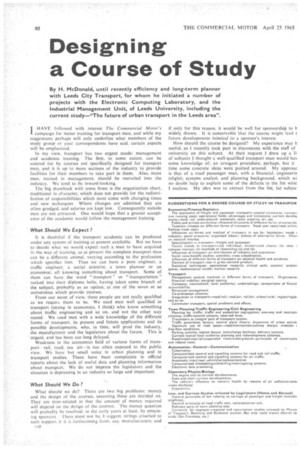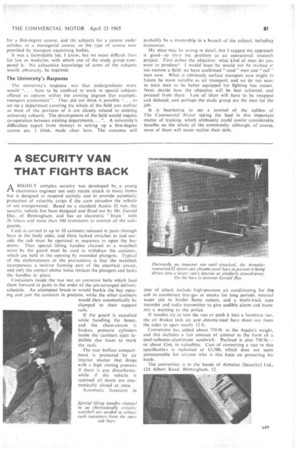Designing a Course of Study
Page 82

Page 83

If you've noticed an error in this article please click here to report it so we can fix it.
By H. McDonald, until recently efficiency and long-term planner with Leeds City Transport, for whom he initiated a number of projects with the Electronic Computing Laboratory, and the Industrial Management Unit, of Leeds University, including the current study—"The future of urban transport in the Leeds area".
I HAVE followed with interest The Commercial Motor's
campaign for better training for transport men, and while my suggestions perhaps will only underline what members of the study group or your correspondents have said, certain aspects will be emphasized.
In my view, transport has two urgent needs: management and academic training. The first, to some extent, can be catered for by courses not specifically designed for transport men, and it is up to more sections of the industry to provide facilities for their members to take part in them. Also, more men, trained in management, should be recruited into the industry. We tend to be inward-looking.
The big drawback with some firms is the organization chart, traditional in character, which does not provide for the redistribution of responsibilities which must come with changing times and new techniques. Where changes are admitted they are often grudged, and salaries are kept low. Consequently outside men are not attracted. One would hope that a greater acceptance of the academic would follow the management training.
What Should We Expect ?
It is doubtful if the transport academic can be produced under any system of training at present available. But we have to decide what we would expect such a man to have acquired in the way of training, as at present the complete transport man can be a different animal, varying according to the profession which specifies him. Thus we can have a pure engineer, a traffic engineer, a social scientist, a town planner or an economist, all knowing something about transport. Some of them can have the word "transport" or " transportation " tucked into their diploma belts, having taken some branch of the subject, probably as an option, at one of the seven or so universities which provide courses.
From our point of view, these people are not really qualified as we requite them to be. We need men well qualified in transport (strong in economics, I think) who know something about traffic engineering and so on, and not the other way round. We need men with a wide knowledge of the different forms of transport, its present and future applications and its possible developments, who, in time, will prod the industry, the manufacturer and the legislature about the future. This is urgent, and has been too long delayed.
Weakness in the economics field of various forms of transport--rail. road. sea air--is too often exposed to the public view. We have but small voice in urban planning and in transport studies. There have been complaints in official reports about the lack of useful data and planning information about transport. We do not impress the legislators and the situation is depressing in an industry so large and important.
What Should We Do?
What should we do? There are two big problems: money and the design of the courses, assuming these are decided on. They are inter-related in that the amount of money required will depend on the design of the courses. The money question will probably he resolVed. in the early years at least. by obtaining sponsors. There must not be. I suggest. strings attached to such support it it is forthcoming from. say. manufacturers: and
if only for this reason, it would be well for sponsorship to 11 widely drawn. It is conceivable that the course might lead t future developments inimical to a sponsor's interest_ How should the course be designed? My experience may t useful, as I recently took part in discussions with the staff of university on this subject. At their request I drew up a of subjects I thought a well-qualified transport man would haN, some knowledge of; an arrogant procedure, perhaps, but it time some concrete ideas were pushed around. My approac is that of a road passenger man, with a financial, engineerin (slight), systems analyst. and planning background, which wi no doubt help to explain some of the defects in the list whic I enclose. My idea was to extract from the list, (a) subjec for a first-degree course, and (b) subjects for a course under articles, or a managerial course, or the type of course now provided by transport examining bodies.
It was a formidable list, I know, but no more difficult than for law or medicine, with which one of the study group compared it. No exhaustive knowledge of some-of the subjects would, obviously, be required.
The University's Response
The university's response was that Undergraduate work would ". . . have to be confined to work in special subjects offered as options within the existing degrees (for example. transport economics)". They did not think it possible "... to set up a department covering, the whole of the field you outline as most of the portions of it are closely related to existing university subjects. The development of the field would require co-operation between existing departments... ". A university's difficulties (apart from money) in setting up a first-degree course are, I think, made clear here. The outcome will probably he a mastership in a branch of the subject, including economics.
My ideas may be wrong in detail, but I suggest my approach is good—to tre.it the problem as an operational research project. First define the objective: what kind of man do you want to produce? I would hope he would not be trained in too narrow a field; we have confirmed " road " men and "rail " men now. What is obviously surface transport now might in future be more suitable as air transport, and we do not want to train men to be better equipped for fighting lost causes Next, decide how the objective will be best achieved, and proceed from there. Lots of ideas will have to be swapped and debated, and perhaps the study group are the men for the job.
It is heartening to see a journal of the calibre of The Commercial Motor taking the lead in this important mattet of training, which ultimately could confer considerable benefits on the whole of the community. although. of course, most of them will never realize their debt.




































































































































